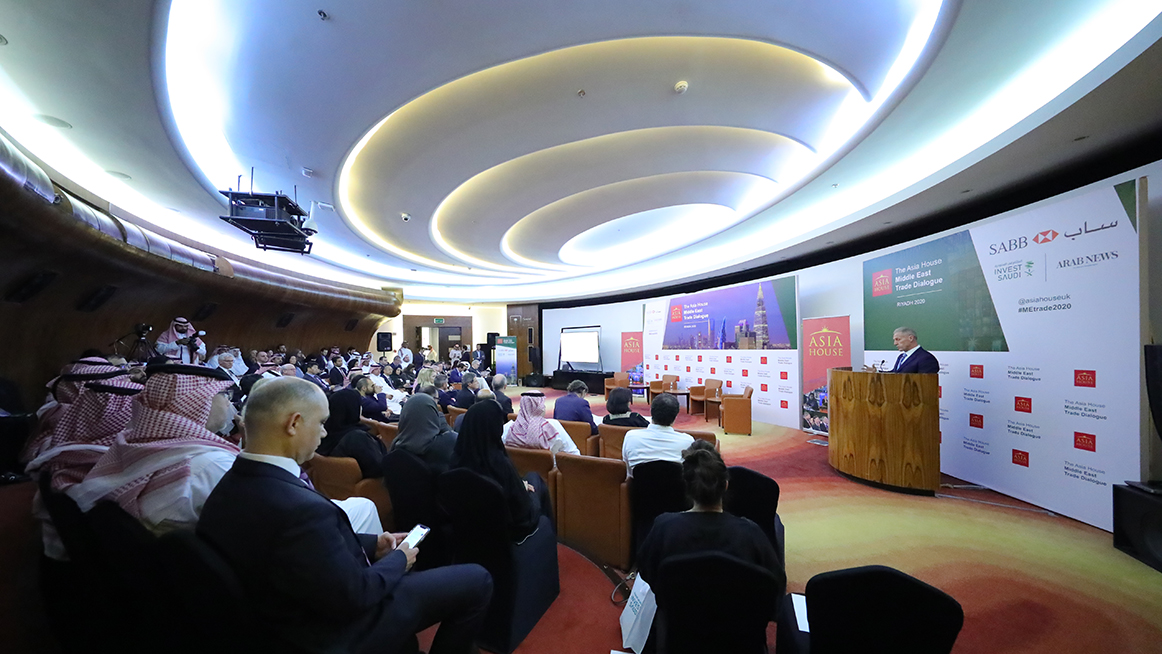Driving commercial and political engagement between Asia, the Middle East and Europe
Driving commercial and political engagement between Asia, the Middle East and Europe
Driving commercial and political engagement between Asia, the Middle East and Europe

The coronavirus outbreak could cost China one month in lost economic activity, while companies in the UK are fearing Christmas shortages due to the virus, leading business and policy figures told a major conference in Riyadh.
The Asia House Middle East Trade Dialogue put key issues facing regional and global trade in the spotlight, with representatives from Saudi British Bank, Saudi Aramco and Accenture among the speakers. Lubna Olayan, Chair, Saudi British Bank, gave the keynote address.
Coronavirus dominated the early discussions at the conference, organised by Asia House – the London-based centre of expertise on trade, investment and public policy.
Speaking live from Beijing during an interview with Asia House Chief Executive Michael Lawrence, Victor Gao, Vice President of the Center for China and Globalization, emphasised the scale of the economic disruption coronavirus is likely to cause.
“By my calculations, China will lose about 20 days because of this great struggle with the virus,” he said. “That’s one working month in terms of lost opportunities.”
Manufacturing sectors would be hit particularly hard, Gao added.
This is causing considerable concern in the UK, according to Simon Penney, Her Majesty’s Trade Commissioner for the Middle East, UK Government, who said businesses are worried about long term effects.
“Retailers in the UK are already anxious about stock for Christmas – that’s 10 months away,” Penney said, adding that the virus will have “a very material impact” on growth and global trade.
The impact of coronavirus will only add to an already-troubled global trade environment, with the rise of economic nationalism and protectionism threatening the very structure of world trade and climate change and disruptive tech posing unprecedented challenges. These issues formed the core of an insightful keynote address from Lubna Olayan, Chair, Saudi British Bank, who warned that markets are becoming increasingly “fractured and regionalised” as the “benefits of globalisation have been forgotten.”
In an expansive and compelling speech, Olayan urged greater cooperation and dialogue from the global community to avert the collapse of the current trade and investment architecture.
“We stand at a fork in the road of global trade,” she said. “Do we allow markets to continue to fragment?”
“This is not an option.”
The dialogue took place amid a programme of sweeping reforms in Saudi Arabia under the Vision 2030 banner, and in the year which the Kingdom hosts the G20.
Emerging technologies are set to play a major role in Vision 2030 – something that Saudi British Bank has been quick to realise. David Dew, Managing Director of Saudi British Bank, highlighted the work the bank has done around new technologies to ensure it is well placed for the future of trade.
“Asia is leading innovation in global trade,” Dew said. “By introducing technologies like blockchain, we’re helping the Kingdom be first to benefit from the digitisation of trade and seize new opportunities in Asia and beyond.”
Diversity was another major focus of the dialogue, with a panel exploring women in the world economy, while sustainability and the shift to renewables were also discussed, given the profound impact they will have on the Middle East.
“Climate change is an issue that has huge implications for the region and one that will become more mainstream as time wears on,” Frank Kane, Senior Business Columnist at Arab News – the dialogue’s strategic media partner – said, drawing on insights from his coverage of Davos and the G20.
Sponsored by Saudi British Bank, the Asia House Middle East Trade Dialogue was held in partnership with the Saudi Arabian General Investment Authority (SAGIA), which hosted the conference at its Riyadh HQ. The conference was part of the Asia House Middle East Programme.
